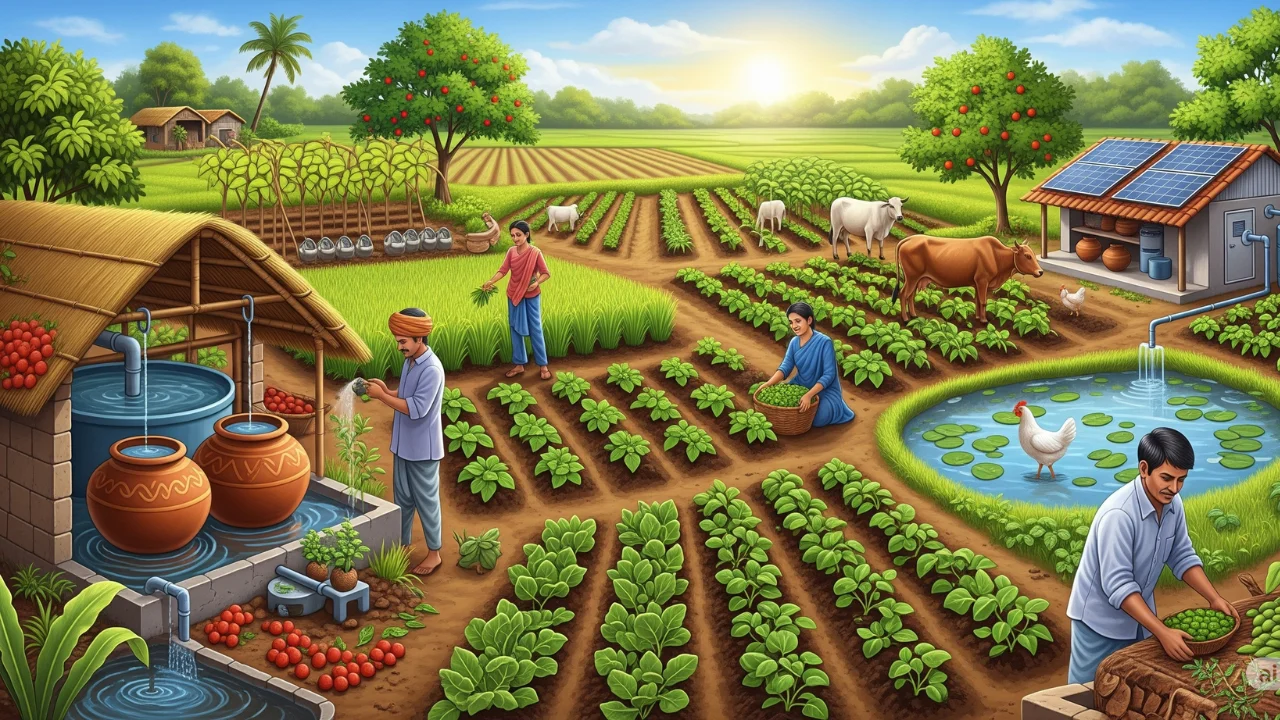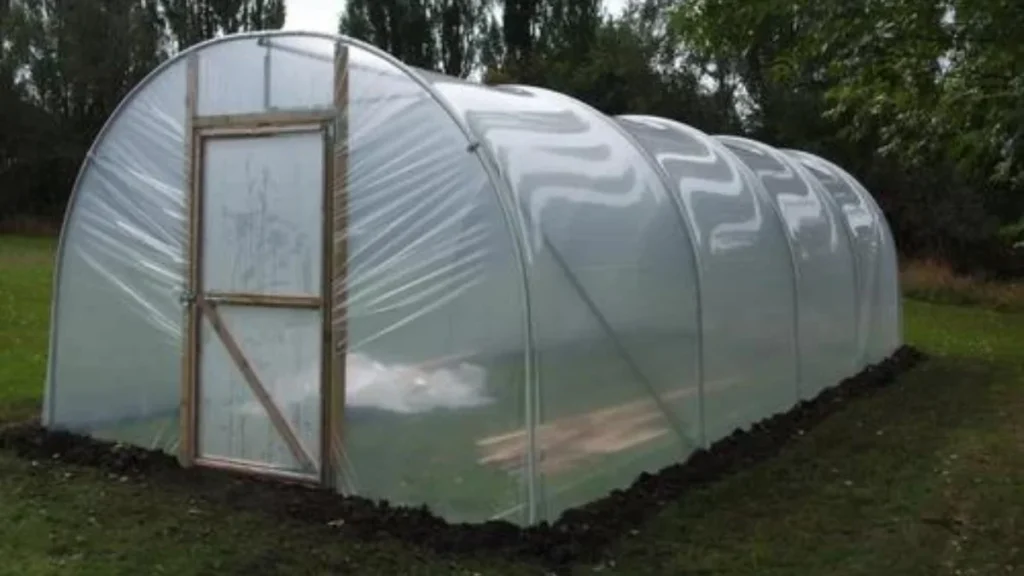Sustainable और regenerative farming अब समय की सबसे जरुरी मांग है। खेती सिर्फ मुनाफा नहीं, बल्कि धरती की सेहत, पर्यावरण और climate safety के लिए भी जिम्मेदारी से करनी पड़ रही है। यही कारण है, भारत के किसान अब जैविक/organic, low-input तथा कम पर्यावरण प्रभाव वाली techniques अपना रहे हैं।
Sustainable farming में crop rotation, cover cropping और Zero/minimum tillage, soil health सुधारते हैं। जीरो tillage और organic manure मिट्टी की क्वालिटी को years तक safe रखते हैं। Jeevamrut, vermicompost और जैविक कीटनाशकों का use chemical input को कम करता है।
- Regenerative agriculture मिट्टी में organic carbon को बढ़ाती है, जिससे climate change impacts कम होते हैं।
- Natural pest predators, intercropping और poly-culture techniques से फसल के रोग, कीट संभालना मुमकिन है।
- Carbon farming और carbon credit schemes से किसान extra income भी पा सकते हैं।
2025 तक government organic certificate वाले products को ज्यादा बढ़ावा दे रही है। Export market में organic fruits/vegetables की demand तेजी से बढ़ रही है। Farmer producer organizations (FPOs) sustainable farming के लिए community model बना रहे हैं। इससे फार्मर को बेहतर दाम, soil health और environment protection मिलता है।
आप भी इन climate-friendly strategies को अपनाएंगे तो environment awareness के साथ profitability में बड़ा difference पाएंगे! Regenerative और Sustainable approaches ही भारत का agri future हैं।
Sustainable Agriculture और Regenerative Farming आज की सबसे बड़ी जरूरत है। Climate change के इस दौर में किसानों को ऐसी techniques अपनानी होंगी जो न सिर्फ अच्छी पैदावार दें बल्कि environment को भी सुरक्षित रखें। जैविक खेती और carbon footprint कम करने की modern techniques से किसान अब दोहरा फायदा उठा सकते हैं।
Sustainable Farming क्या है?
Sustainable farming का मतलब है ऐसी खेती करना जो लंबे समय तक चलती रहे और natural resources को नुकसान न पहुंचाए। इसमें soil health maintain करना, water conservation, biodiversity को बचाना और chemical fertilizers का कम इस्तेमाल शामिल है। यह approach future generations के लिए भी farming को secure बनाता है।
Regenerative Agriculture के फायदे
- Soil Health Improvement: Organic matter बढ़ाकर मिट्टी की fertility restore करना
- Carbon Sequestration: Atmosphere से carbon को soil में store करना
- Water Retention: मिट्टी की पानी सोखने की क्षमता बढ़ाना
- Biodiversity Enhancement: Beneficial insects और microorganisms को बढ़ावा देना
जैविक खेती की Modern Techniques
आजकल की organic farming में traditional methods के साथ-साथ modern science भी शामिल है। Vermicomposting, biofertilizers, और biopesticides का इस्तेमाल करके किसान chemical-free farming कर सकते हैं। Companion planting और crop rotation जैसी techniques से soil health maintain रहती है और pest problems भी कम होती हैं।
Carbon Footprint कम करने के तरीके
Carbon footprint कम करना agriculture का बड़ा challenge है। Cover crops लगाकर, no-till farming अपनाकर, और agroforestry systems से किसान atmospheric carbon को soil में store कर सकते हैं। Precision agriculture से fertilizer और fuel की consumption भी कम हो जाती है।
Indian Success Models
महाराष्ट्र के कुछ farmers ने Zero Budget Natural Farming (ZBNF) अपनाकर अपनी input costs 90% तक कम की है। कर्नाटक में agroecology practices अपनाने वाले किसानों की income 40% तक बढ़ी है। राजस्थान में solar-powered irrigation और drip systems से water और energy दोनों की बचत हो रही है।
Carbon Credits से Extra Income
भारत में carbon credit market तेजी से बढ़ रहा है। Sustainable practices अपनाने वाले farmers अब carbon credits sell करके extra income भी कमा सकते हैं। Government भी carbon neutral farming को promote कर रही है और इसके लिए incentives दे रही है।
Water Conservation और Soil Health
Rainwater harvesting, mulching, और integrated pest management से farmers अपनी resource efficiency बढ़ा सकते हैं। Soil testing regular करवाकर balanced nutrition दे सकते हैं। Mycorrhizal fungi और beneficial bacteria का इस्तेमाल करके natural soil ecosystem को strong बना सकते हैं।
Technology Integration
Modern sustainable farming में IoT sensors से soil moisture और nutrient levels monitor कर सकते हैं। Weather stations से precise weather data मिलता है जो irrigation और pest management में help करता है। Mobile apps से organic inputs के suppliers भी मिल जाते हैं।
Market Opportunities
Organic produce की demand तेजी से बढ़ रही है। Urban consumers healthy food के लिए premium price pay करने को तैयार हैं। Direct marketing, farmer markets, और online platforms से farmers better prices मिल रहे हैं। Export market में भी Indian organic products की अच्छी demand है।
Practical Implementation Steps
- छोटे area से organic farming की शुरुआत करें
- Composting और vermicomposting system set up करें
- Crop rotation plan बनाएं और implement करें
- Local organic certification के लिए apply करें
- Sustainable farming communities से जुड़ें
निष्कर्ष: Sustainable और regenerative farming सिर्फ environment के लिए ही नहीं बल्कि किसानों की economic prosperity के लिए भी जरूरी है। यह approach long-term में soil health, water security, और climate resilience सभी को improve करती है।


